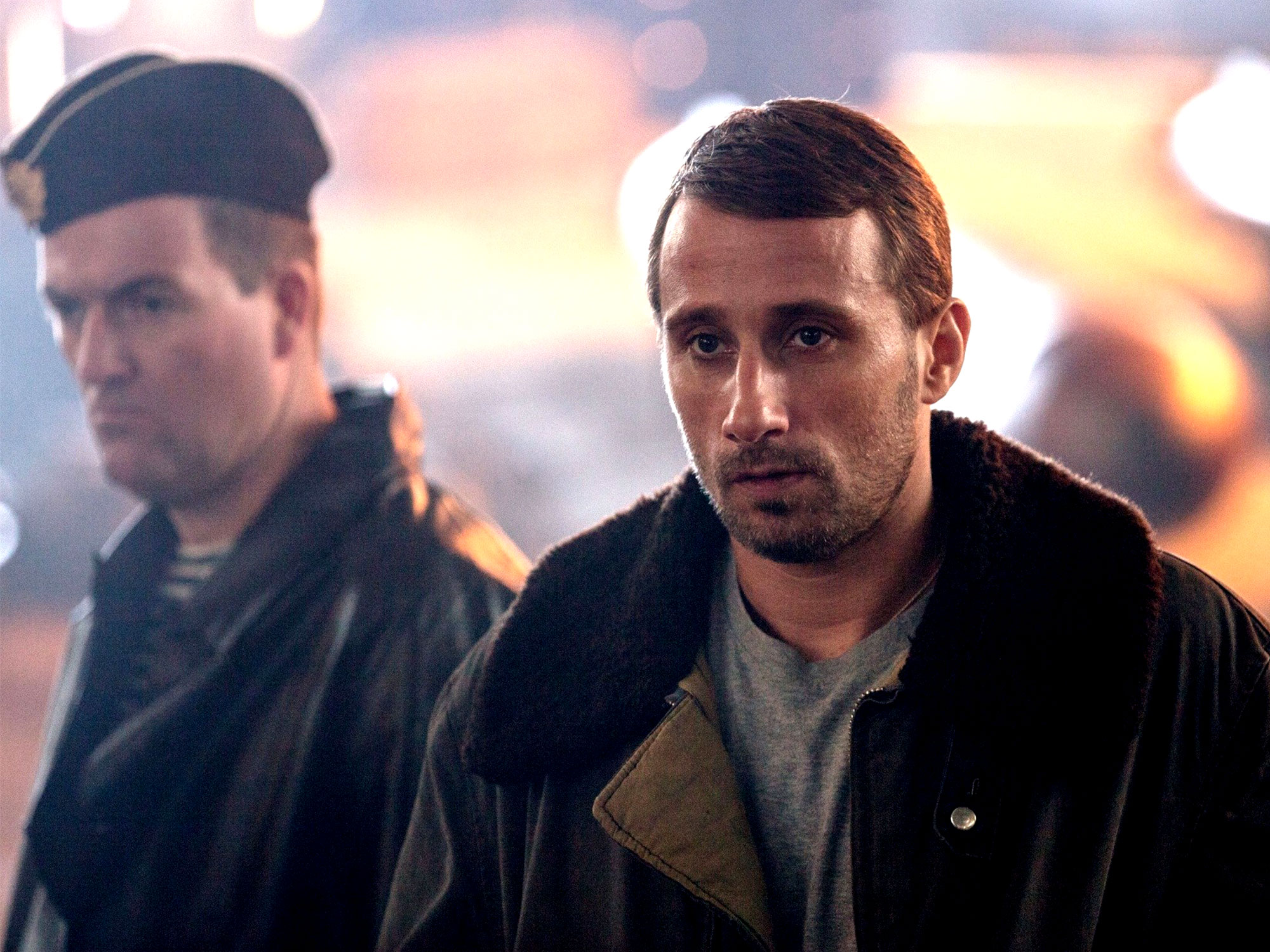
As the opening credits – white on a blank black background – roll, we hear watery sounds and a gasping inhalation. Young Misha (Artemiy Spiridonov) appears in medium close-up, completely underwater, and the arm of Mikhail Averin (Matthias Schoenaerts) moves in front of his face so that the little boy can time how long he holds his breath by his father’s naval watch. In fact Misha is merely in a small domestic bathtub, but his struggle for air amid surrounding water foreshadows what is to come, as does that watch, marking the time running out before a breath must once again be taken.
The captain-lieutenant of a Russian submarine, Mikhail will not keep his watch for long. For he and his fellow crew members, still waiting for their service pay, have to trade in their watches in order to purchase the booze for the wedding party of their friend Pavel (Matthias Schweighöfer). Time has run out for all of these men, and the full significance of this becomes clear when we realise that the vessel they are about to board for a naval exercise in the Barents Sea is the Kursk, which, during manoeuvres in 2000, sank to the sea floor after an onboard explosion caused by a faulty torpedo.
Several men survived the initial and subsequent blasts, and struggled to stay alive in a compartment with waters rising and air running out, even as rescue efforts were frustrated by the Russians’ ill-maintained equipment, Cold War mentality and refusal to accept foreign assistance.
Adapted by Robert Rodat from Robert Moore’s forensic non-fiction account of the disaster ‘A Time To Die’, Thomas Vinterberg’s Kursk: The Last Mission presents a sequence of real events that are in the public domain, if not necessarily familiar to everybody. And so it plays a double game, keeping some viewers on tenterhooks with the tension of not knowing what will happen next, while hammering others with the dramatic irony that their foreknowledge of events brings.

The cameraderie of the men, established early on by their willingness to sacrifice their own watches for a friend, is what will bind them in the face of their increasingly desperate circumstances, as they continue to work together, tell stories, sing songs, take collective risks and write what might be their last goodbyes to their loved ones. All these humanising interactions are acceptable fictive extrapolations, for there is no way of knowing in any detail what went on inside the stricken Kursk. The problem is that they are also clichés – and as Matthias repeatedly steals glances at family photos, anyone who has seen a disaster movie before will have a pretty good idea, even without recourse to the historical record, that he is doomed.
In Xavier Dolan’s Mommy, there’s an extraordinary moment when, just as the protagonist’s otherwise constrained horizons suddenly broaden, the film’s Academy ratio stretches to widescreen. A similar trick is pulled in Kursk, but to far less compelling effect. It begins with its landlocked scenes presented in an aspect ratio of 1.66:1 but opens out to 2.35:1 once the sub has dived.
What at first seems a boldly paradoxical decision – to go wide only as the film’s setting become more claustrophobic – is undermined when the widescreen is maintained for scenes above the surface: Tanya and the other wives confronting the authorities (including Max von Sydow’s patronisingly deceitful Admiral Petrenko); British Commodore David Russell (Colin Firth) trying to convince the Russians to let him help. A return to the narrower frame in the film’s final scenes comes with no more obvious rhyme or reason. The cinematographic grammar is ill-conceived, a pointless and distracting gimmick that fails in any way to assist the drama.
Kursk is both a waiting game and a race against the clock. Even before they go on their ill-fated voyage, these men are waiting – for long-delayed pay, for the arrival of newborns – and once they are trapped on the ocean bed, they must wait some more, as time rapidly gets away from them. In their confined and hostile environment, as in Gray Lady Down, Das Boot, K-19: The Widowmaker, all their hopes and fears, all their sad dreams and futile efforts, take on an existential complexion, offering a highly pressurised encapsulation of the human condition. All this is both gripping and harrowing. The film’s other focus – on Russian political arrogance and cover-up – never gets much beyond surface level.
The post Kursk: The Last Mission appeared first on Little White Lies.
![Forest Essentials [CPV] WW](https://s3-us-west-2.amazonaws.com/pcw-uploads/logos/forest-essentials-promo-codes-coupons.png)
0 comments